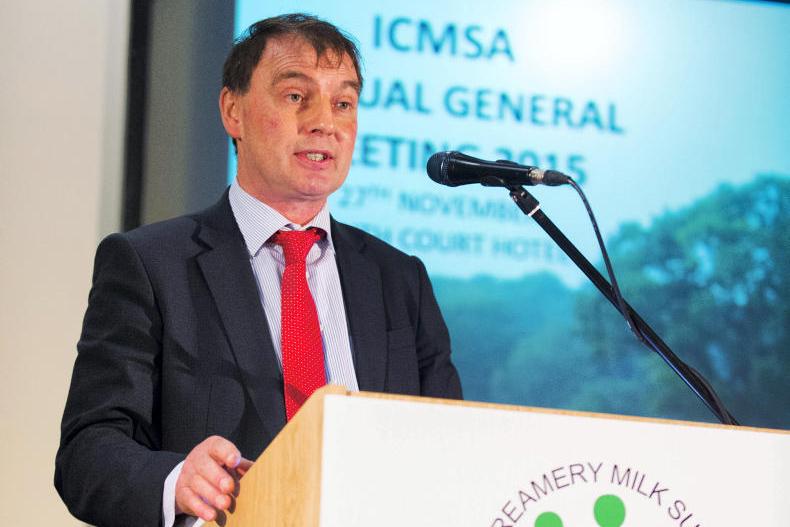“A big day for the organisation – the views of our members, as heard here today, are what drives policy,” said ICMSA president John Comer of the association’s AGM on Monday.
The terrible prices predicted at the 2015 AGM are finally relenting as dairy markets slowly recover, but Comer highlights the inevitability of another slump in the future, and the need for better support for farmers.
“I think we have a wholly inadequate suite of measures to counteract dairy market and milk price volatility, at both national and European level. Quotas were not fit for purpose in the first instance. We always said they were a lazy tool, but the removal of quotas, coupled with increasing globalisation, has increased volatility,” he said.
“You cannot have a fully market-oriented product when you have a three-year lead-in from breeding the future animal to either bringing it to the abattoir (for beef) or the milking parlour. Farmers must plan long-term, and cannot easily respond to sudden price shifts. Stability is essential,” stressed Comer.
There is recognition at long last of this by the commissioner and indeed the minister, Comer continued, but the measures must be in place and available automatically.
“We don’t need to have crisis meetings and protracted delays, so by the time the measures are made available to farmers the markets are starting to recover anyway.
“Markets will always eventually recover if nothing is done, but at a terrible price. A swathe of farmers will go broke, the supply will contract, and the price will go up again. We in ICMSA think there is a better way of doing business, by helping the most vulnerable, who are primary producers,” he said.
Listen to the interview with John Comer in our podcast below:
Listen to "ICMSA president John Comer" on Spreaker.
“I would like to see intervention fulfilling the original concept: that when milk price falls below the cost of production, intervention would kick in. It did so in the last crisis in 2009, when the 20.4c/l price was some reflection of costs, but costs are now 28c/l, so the intervention price must increase significantly, at enough volumes to stabilise the market.
“That, coupled with a readily available voluntary reduction scheme would be a huge step forward. The reduction scheme was a most pragmatic system. It gave me as a farmer the choice to continue to produce at the market price, or to choose to stop production temporarily to help markets to recover. Without a product being produced, there is nothing overhanging the market,” he explained.
Efficiencies
In relation to costs, Comer said that of course farmers needed to be efficient and to minimise costs. “After that, they can do no more, but Government can do a lot. The cost of insurance has risen sharply; it needs to be addressed. Similarly, the cost of credit is high: farmers are paying €80m a year more than our European counterparts.”
John Comer described Revenue’s letter to Kerry shareholders as “a bolt from the blue”.
He went on to say: “Our office has been inundated with calls from concerned suppliers. On the face of it, one would say it doesn’t appear to be consistent with custom and practice that existed heretofore.
“Having said that, ICMSA is working in the background to achieve some clarity from Revenue, to exact something from this situation that represents fairness, and I don’t want to comment publicly too much during this process,” he concluded.
Crisis fund
Minister for Agriculture Michael Creed must have been wondering if ICMSA members shared their president’s concern regarding interest rates, as speaker after speaker lambasted his use of the crisis fund money to underpin the €150m low-interest loan scheme for all farmers.
The floor wanted a repeat of 2015, when Simon Coveney doubled the fund with national monies and paid it directly to dairy and pig farmers. There was also trenchant criticism of the beef payment grid.
Brexit
Both the minister and former Taoiseach John Bruton addressed the meeting, with Bruton, speaking on the possibilities post-Brexit. When Brexit talks begin, John Comer said the key issues are already clear: “Free access to the UK market; CAP implications; and common production standards for on-farm issues.”
Kerry
There were some impassioned opinions expressed on the Kerry shares/Revenue issue. “How right do you think that this is? A letter sent to tax compliant people,” said one farmer, speaking of the fear and anger among co-op sharfeholders. “This country was freed for all of us – and not just a select few. Stop Revenue from bullying us out of this country.”
“The tax laws are there, it’s up to Revenue to interpret them,” responded the minister. “The tax laws have not changed.”






 This is a subscriber-only article
This is a subscriber-only article









SHARING OPTIONS: